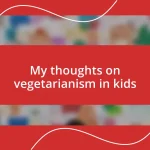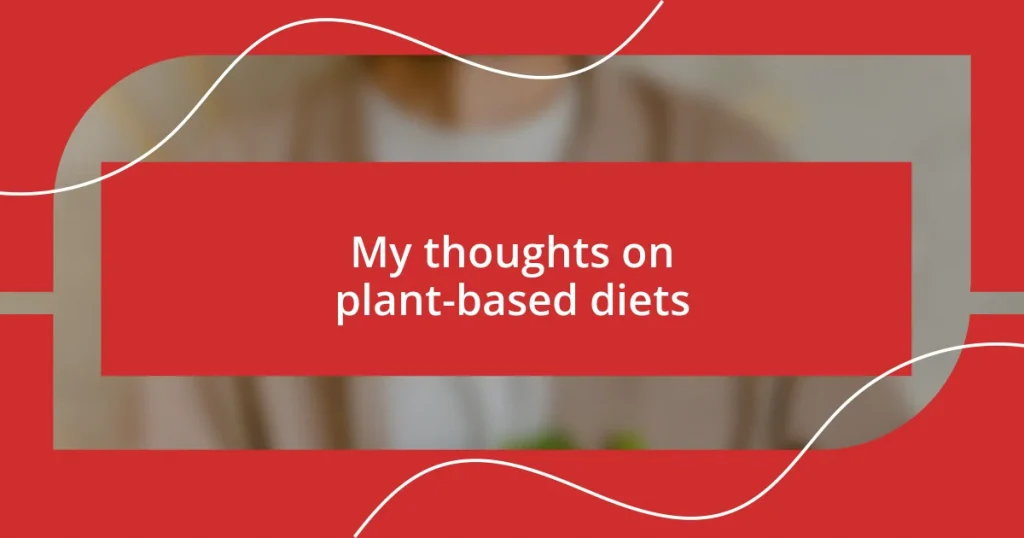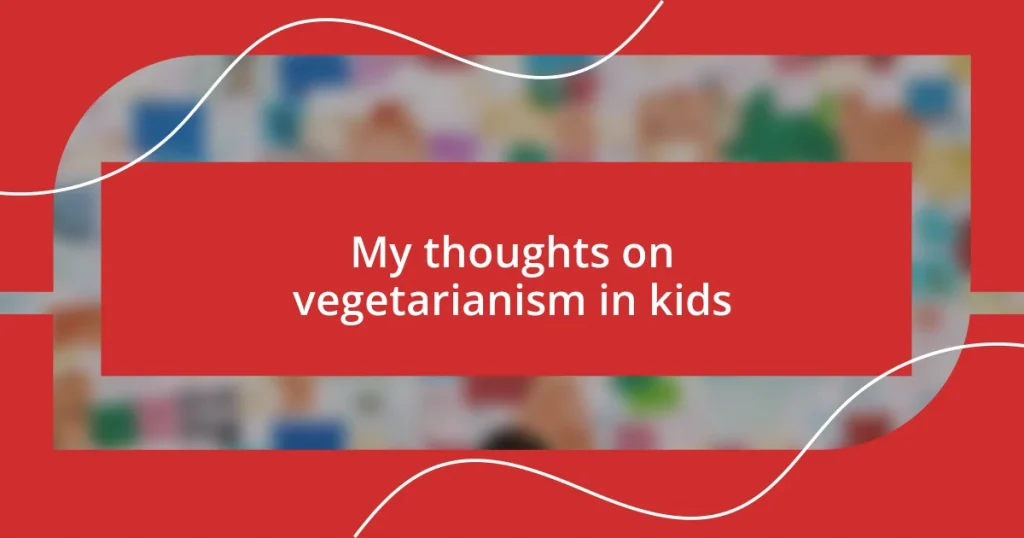Key takeaways:
- Adopting a plant-based diet can significantly enhance physical health, energy levels, and mental well-being, while also promoting sustainability.
- Common misconceptions about plant-based diets include beliefs that they lack protein, are boring, or require advanced cooking skills; this is not true, as there are many flavorful and simple options available.
- Nutritional considerations are crucial, especially for iron, vitamin B12, and omega-3 fatty acids; integrating specific food pairings or supplements can help achieve a balanced diet.
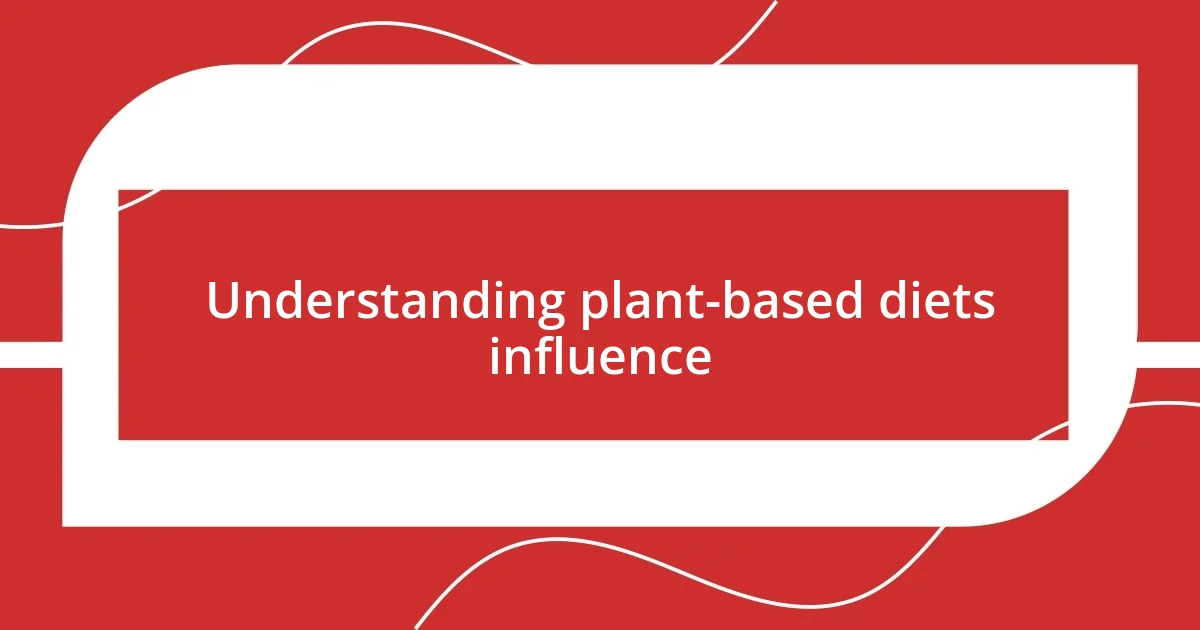
Understanding plant-based diets influence
When I first started exploring plant-based diets, I was struck by the profound influence they can have on our physical health. I noticed that after a few weeks of incorporating more fruits and vegetables into my meals, I felt lighter, more energized, and even more focused throughout the day. Isn’t it fascinating how the food we consume can create such a powerful impact on our well-being?
Beyond health, plant-based diets carry a significant cultural and environmental influence. I remember attending a community potluck, where every dish was plant-based, showcasing not just nutrition but also creativity in cooking. It made me reflect: how often do we overlook the connections between our food choices and their effects on the planet? Plant-based eating encourages us not just to enhance our personal health but also to support sustainability initiatives, which are critical in today’s world.
Furthermore, the social dynamics of embracing a plant-based lifestyle can be quite intriguing. I experienced a blend of support and skepticism from friends and family when I transitioned. It made me question: could altering our eating habits really ignite broader conversations about health and ethics in our communities? This journey not only transformed my plate but also sparked engaging discussions around food choices and their ethical implications.
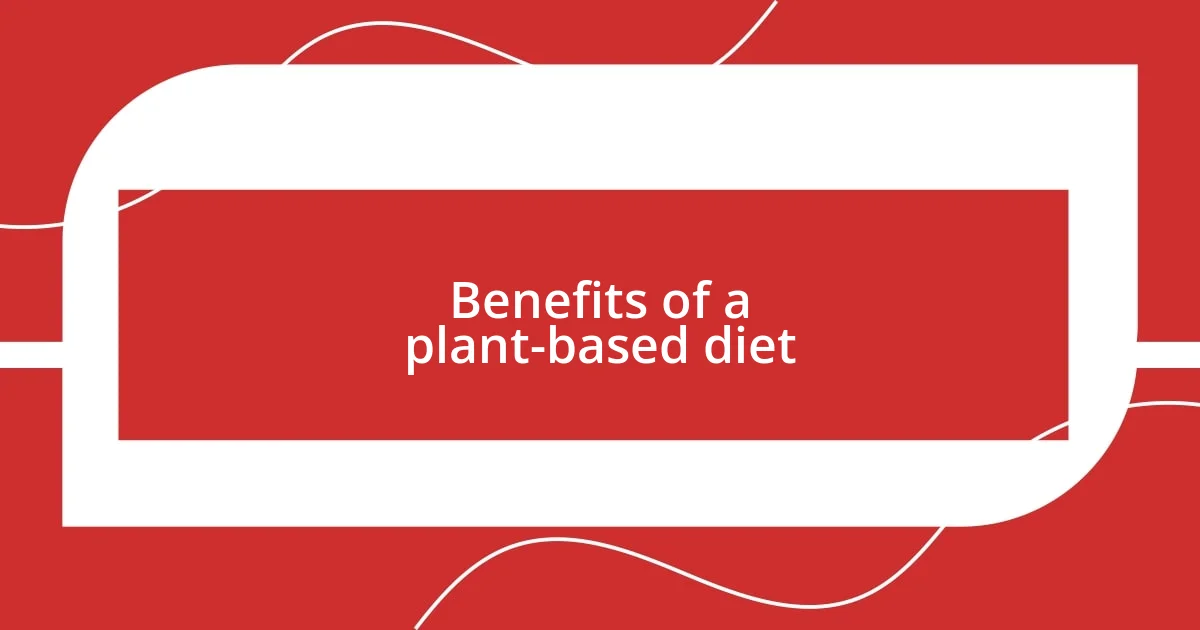
Benefits of a plant-based diet
When I adopted a plant-based diet, one of the most notable benefits was the boost in my overall well-being. I used to experience sluggish afternoons filled with caffeine crashes. However, after about a month of focusing on whole foods like legumes, whole grains, and plenty of colorful vegetables, I noticed a significant increase in my energy levels. The difference was so remarkable that it felt as though I had flipped a switch, and I could hardly believe how much lighter I felt both physically and mentally.
Here are some compelling benefits I’ve encountered:
- Improved Digestion: The fiber in plant-based foods works wonders for gut health.
- Weight Management: Many people find it easier to maintain or lose weight on a plant-based diet.
- Heart Health: A reduction in cholesterol and blood pressure often results from eating more fruits and vegetables.
- Increased Nutrient Intake: A variety of plants provides essential vitamins, minerals, and antioxidants.
- Sustainability: Choosing plant-based options can help reduce our carbon footprint, benefiting the planet.
I distinctly remember how my mood began to brighten as my plate transformed. Sharing meals that were not only nutritious but vibrant and colorful sparked joy within me. I could see the difference in how I felt physically, and it felt rewarding to be making choices that contributed to my health and the health of the planet.
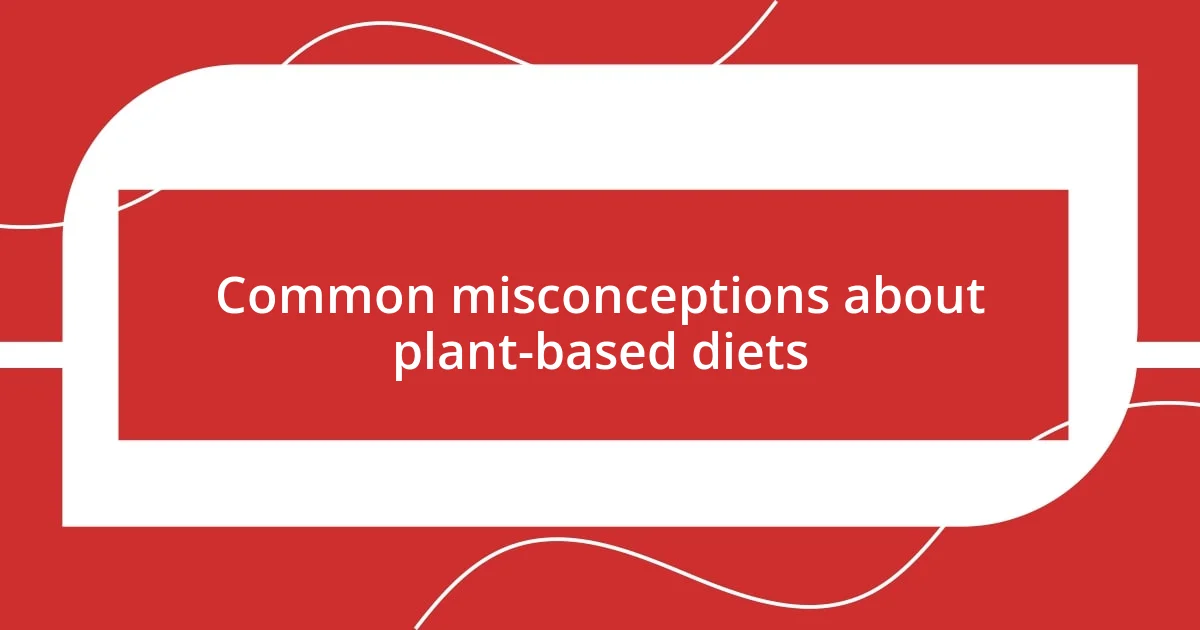
Common misconceptions about plant-based diets
The first misconception I often hear about plant-based diets is that they’re lacking in protein. I’ve had friends express concern regarding where I get my protein, as if I’d be constantly hungry without meat. In my experience, foods like beans, lentils, tofu, and quinoa are not only rich in protein but also offer a variety of other nutrients. It was enlightening for me to discover that my plant-based meals could provide sufficient protein while also being incredibly tasty and fulfilling.
Another common myth is that plant-based eating is overly restrictive and boring. Initially, I worried that I’d miss out on my favorite flavors and textures, but I soon found myself experimenting with spices and cooking techniques that opened up a new world of culinary possibilities. For instance, I began to create delicious jackfruit tacos that delighted my taste buds and even impressed my meat-loving friends. The joy of cooking has truly been amplified by my embrace of diverse plant-based recipes.
Lastly, some people believe that plant-based diets are only for those with lofty culinary skills or a passion for health food. I can relate to the intimidation that comes with the idea of creating elaborate dishes, but I’ve found that simplicity often yields the best results. I remember the first time I just tossed roasted veggies with olive oil and spices; it was so easy, yet the flavors delighted my palate. Plant-based eating is very much accessible, proving that anyone can enjoy wholesome food without needing to be a gourmet chef.
| Misconception | Reality |
|---|---|
| Plant-based diets lack protein | Rich sources of plant-based protein include lentils, beans, and quinoa. |
| Plant-based eating is boring | With creativity, there’s a diverse array of flavors and dishes to explore. |
| Requires elite culinary skills | Simple, delicious meals can be made with minimal cooking experience. |
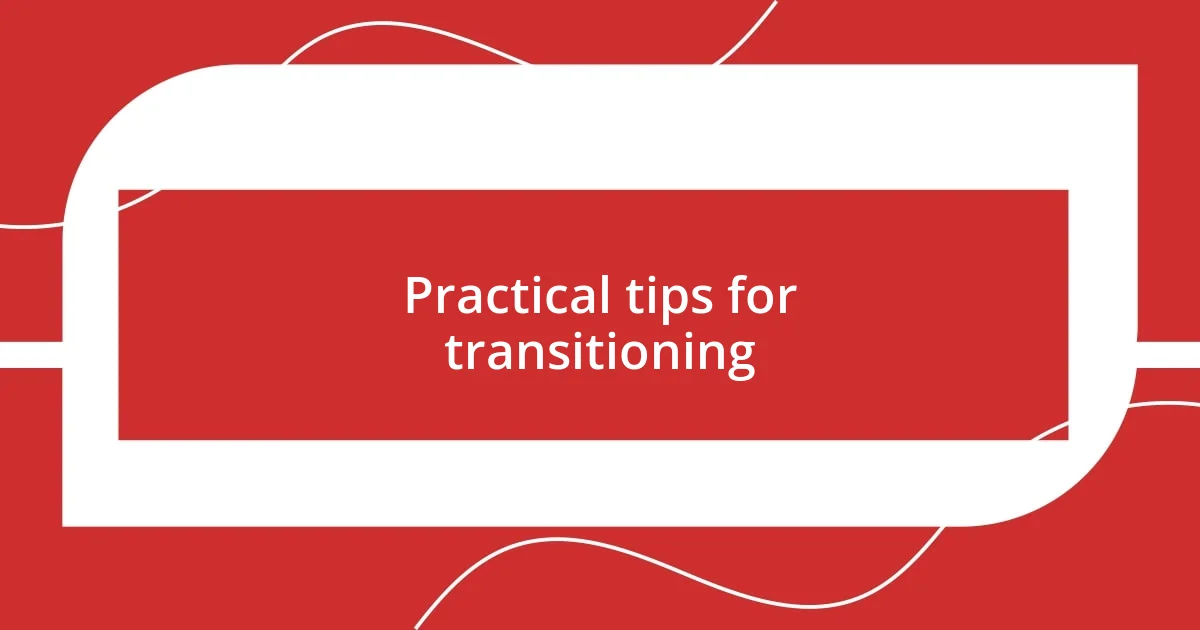
Practical tips for transitioning
Transitioning to a plant-based diet can feel daunting, but I found it helpful to start with small changes. For me, swapping out one meal a day for a plant-based option made the process feel more manageable. Gradually, it became a joy to explore new recipes and ingredients without overwhelming myself.
One tip I often share is to embrace the abundance of flavors found in plants. When I first tried cooking with a variety of spices, I was blown away by how much flavor I could unlock in simple dishes. Have you ever thought about how just a pinch of cumin can transform a basic veggie stir-fry into something extraordinary? This kind of culinary exploration not only makes meals more exciting but also keeps the joy of cooking alive.
Finally, I recommend finding community support, whether online or in person. I remember joining a plant-based cooking class, and it was such a revelation to share experiences and tips with others just like me. It’s amazing how much encouragement and inspiration can come from connecting with others on the same journey. Isn’t it reassuring to know you’re not alone in this transition?
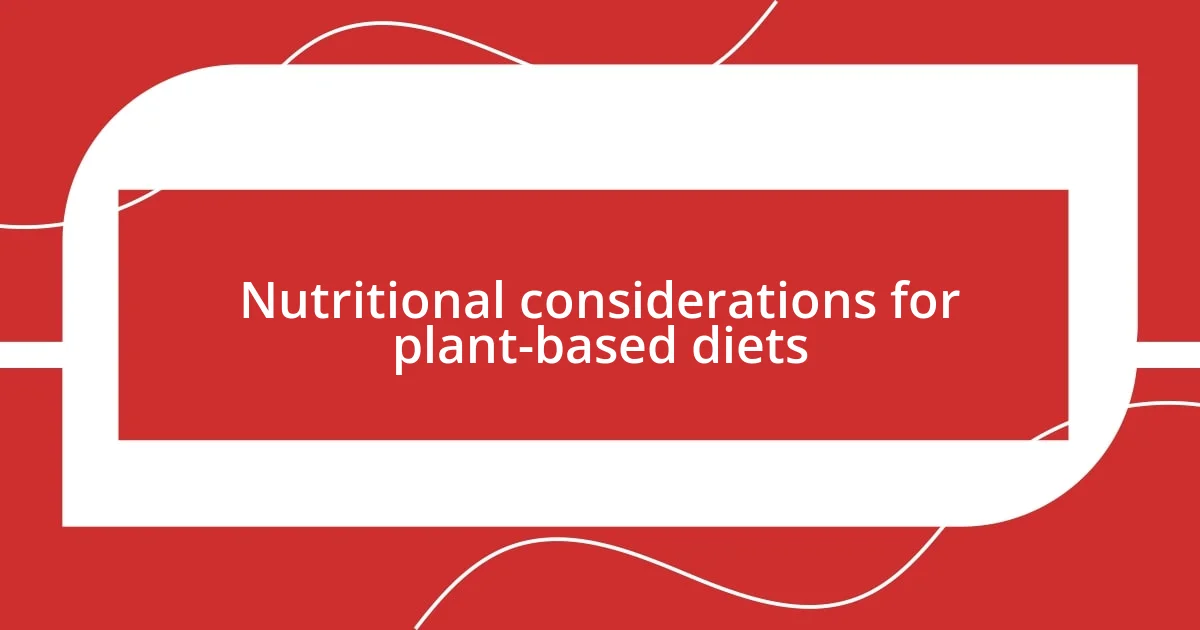
Nutritional considerations for plant-based diets
When considering nutritional aspects of a plant-based diet, it’s essential to acknowledge that certain nutrients are crucial for maintaining overall health. For instance, I noticed that iron levels can be a concern since plant sources like spinach and lentils contain non-heme iron, which isn’t absorbed as easily as the heme iron found in meat. To combat this, I began pairing these foods with vitamin C-rich options like citrus fruits, which significantly improved my iron absorption. Have you ever made simple adjustments to boost your nutrient intake?
Another important consideration is vitamin B12, primarily found in animal products. I remember the first time I learned about this; it was quite a revelation! I had to be proactive about incorporating fortified foods or a reliable supplement into my routine. It made me realize how essential it is to educate ourselves on these specifics when embracing a plant-based lifestyle. The idea of missing out on vital nutrients felt unsettling at first, but adapting became empowering.
Additionally, omega-3 fatty acids are typically associated with fish. I often reflect on my initial struggle to find plant sources like flaxseeds or chia seeds, but once I did, it opened up a new dimension to my meals. Adding these to smoothies or oatmeal not only enhanced the nutritional content but also added a nice texture. This discovery reinforces the notion that with a little bit of research and experimentation, we can achieve balanced nutrition on a plant-based diet. Isn’t it uplifting to think about the possibilities?
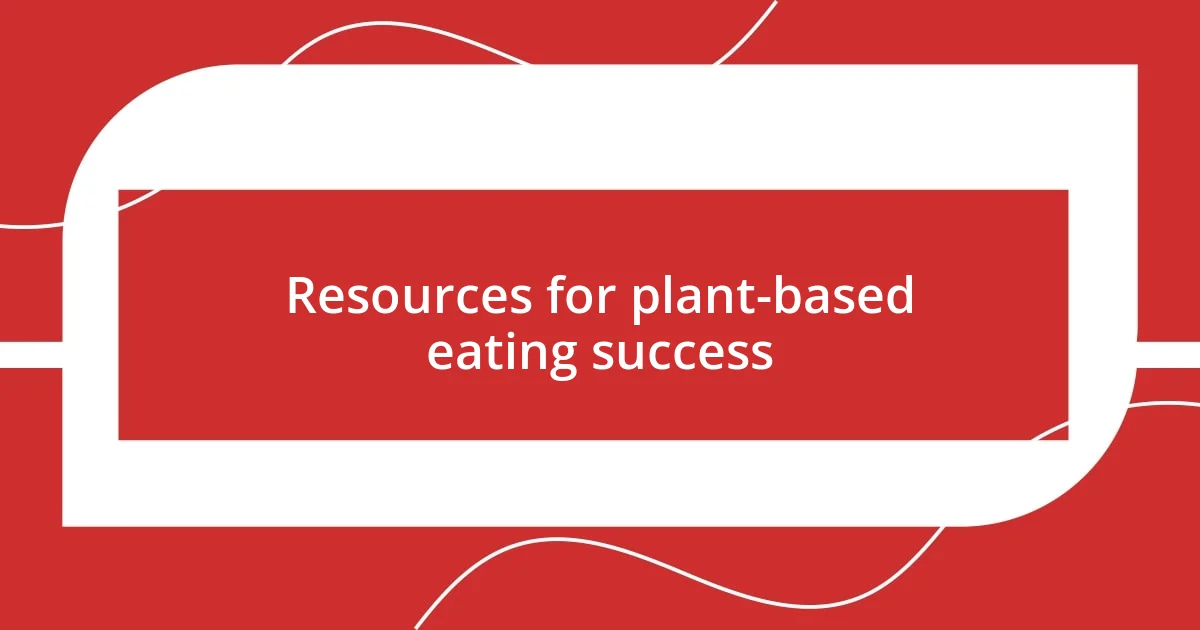
Resources for plant-based eating success
Finding resources to support a plant-based lifestyle can elevate your experience and make it more enjoyable. I often turn to websites and apps specifically tailored for plant-based eating, where I can discover meal plans and shopping lists. One such app I stumbled upon not only offers recipes but also allows you to filter by dietary needs, making it perfect for anyone with specific restrictions.
Books are another fantastic resource. I became fascinated by a plant-based cookbook that explained the science behind the ingredients and provided not just recipes but also the nutritional benefits of each component. Have you ever felt inspired flipping through a beautifully illustrated cookbook? It’s like embarking on a culinary adventure right in your kitchen!
Lastly, don’t underestimate the power of online communities and social media groups dedicated to plant-based living. When I joined a Facebook group, it felt like a breath of fresh air, surrounded by like-minded individuals who share recipes, tips, and encouragement. I remember my first post asking for advice, and the flood of supportive responses was overwhelming. Isn’t it comforting to know that there’s a world of support out there waiting to help you on your journey?


